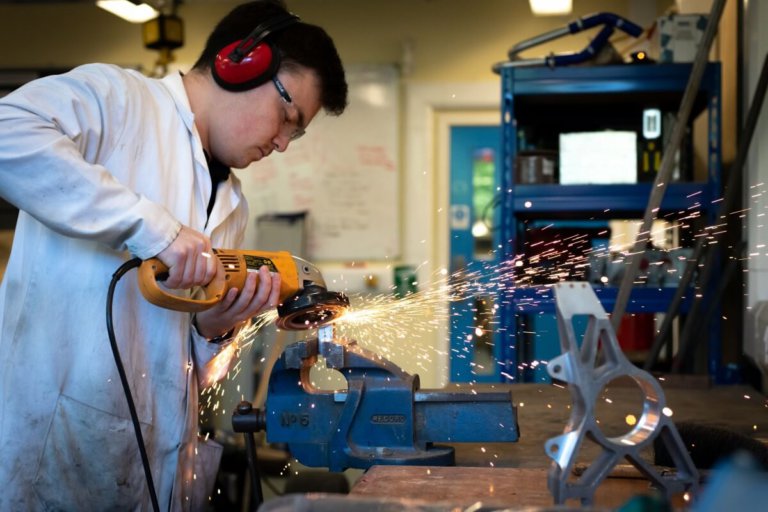
rThe Fourth Industrial Revolution is driving sweeping transformation to the way we live and work. In this era increasingly powered by advanced technologies like artificial intelligence, quantum computing, automation, and robotics, all industries are set for new opportunities and disruptions.
One of the most relevant degrees to study in preparation of this envisioned future is robotics engineering. The field offers excellent career opportunities for graduates across several industries, ranging from healthcare to education to medicine.
As the World Economic Forum predicted in their Future of Jobs report in 2018, “Companies across all sectors are most likely to adopt the use of stationary robots, in contrast to humanoid, aerial or underwater robots, however leaders in the Oil & Gas industry report the same level of demand for stationary and aerial and underwater robots, while employers in the Financial Services industry are most likely to signal the planned adoption of humanoid robots in the period up to 2022.”
As this young industry is becoming more competitive, a degree alone would not suffice. Graduates must demonstrate they have the soft skills employers are demanding to see in their organisations too, such as creative problem-solving and collaboration.
Here are four leading engineering departments in Europe which arm students with the hard and soft skills required to be job-ready robotics graduates:
DEPARTMENT OF ENGINEERING AND DESIGN – UNIVERSITY OF SUSSEX
This UK university offers a number of undergraduate and graduate programmes that develop specific expertise in robotics alongside an engineering degree.
For example, students can undertake the BEng or MEng in Electrical and Electronic Engineering with Robotics or BEng or MEng in Mechanical Engineering with Robotics degree programmes.

Source: University of Sussex
There is also an option for the same programmes with an industrial placement year, where students can gain work experience in the industry for a year, while still being supported by Sussex. Such experiential learning opportunities have been proven to increase student interest, make the absorbing of complex material easier and provide exposure to high-level research, among others.
In all courses at Sussex, students benefit from the world-class research in robotics conducted at the university, as well as the multi-million pound Future Technologies Labs. At this state-of-the-art facility, they can design and build robots as well as work on programming embedded systems and innovative computer design and modelling suites.
Students will also have access to the flexible manufacturing system at the department, alongside autonomous vehicles, industrial robotic manipulators, humanoid robots, fleet of drones, and a real-time motion monitoring system.
The final year projects can be individual or group projects, covering various areas of the field such as medical robotics, autonomous vehicles, control systems, machine vision and others.
FACULTY OF ENGINEERING – UNIVERSITY OF SOUTHERN DENMARK
This university offers an innovative MSc in Engineering in Robot Systems course where students take part in the development that occurs within drone- and robot systems.
They can choose to either specialise in Advanced Robotics Technology or Drones and Autonomous Systems.

Source: University of Southern Denmark
The Drones and Autonomous Systems specialisation was designed in close cooperation with the UAS Test Center. Part of the teaching will take place at the HCA Airport.
In these specialisations, students learn how to develop robots with artificial intelligence that can be used in a number of different industries, or work with drones that inspect power lines or buildings, deliver blood samples to hospitals, or other useful purposes.
To ensure students develop global perspectives, the university encourages students in this programme to spend one or two semesters abroad doing an internship or as an exchange student.
VILNIUS GEDIMINAS TECHNICAL UNIVERSITY
Located in Lithuania, this university offers a Master of Engineering Sciences in Mechatronics – a multidisciplinary degree that encompasses mechanical engineering, computer engineering, and electronics. Robotics falls under the umbrella of Mechatronics as it involves expertise in all three fields.
In this course, students become well-prepared for the field as they develop comprehensive and up-to-date knowledge in mechatronics including mechanical engineering, information technologies, mechatronic systems and mathematical modelling.

Source: Vilnius Gediminas Technical University
They also become specialists equipped with analytical, modelling and projection skills in manufacturing and process management of mechatronic systems.
At this university,students can diversify their skills through graduate projects, internships and student exchange opportunities in Germany, Austria, Finland, Greece, Portugal, South Korea, Taiwan, Poland, Ukraine, Belarus and many other countries around the world for one or two semesters.
Upon graduation, they will be ready to work as expert consultants or take on leadership roles in the rapidly advancing field of mechatronics.
ÉCOLE POLYTECHNIQUE FÉDÉRALE DE LAUSANNE (EPFL)
This premier university located in Switzerland offers a Master’s programme in Robotics, providing theoretical knowledge as well as hands-on learning in the practice of intelligent robots such as mobile robots, wearable robots, robotic manipulators, autonomous and brain-interfaced robots.
Through hands-on learning activities, students learn first-hand how to design, prototype, and validate robotic systems.
Classes span from electromechanical systems to advanced artificial intelligence to prepare students for the field.

Shutterstock
Students also receive practical learning opportunities through working with researchers on challenging problems at EPFL’s robotics laboratories or in industry.
They also benefit from EPFL’s strong innovation ecosystem that encourages the invention of new systems and applications, and can even receive support to start up their own company.
Upon graduation, students are well-qualified to work in a wide range of fields where robotics technologies are seeing rapid implementation such as biomedical technologies, logistics and transportation, aviation and drones, autonomous cars, Industry 4.0, smart houses, and environmental technology.
*Some of the institutions featured in this article are commercial partners of Study International
Liked this? Then you’ll love…
University of Sussex: The key to your future engineering success
Join the materials science and engineering revolution in Industry 4.0







